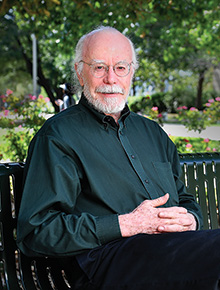Peace Studies Expert David Mason
David Mason received the 2016 Eminent Faculty Award.
December 8, 2016

David Mason (Photo by Michael Clements)
David Mason doesn't claim to be an economist or a Wall Street expert, but he's found an investment with a 6,000 percent return — peace studies.
Mason, a UNT Regents Professor of political science, says that's largely because peace scientists have learned how to write peace agreements that "bring conflicts to earlier and less destructive conclusions."
"The World Bank estimates that civil wars cause on average $60 billion worth of destruction," says Mason, winner of the UNT Foundation's 2016 Eminent Faculty Award, presented annually to faculty for outstanding and sustained contributions to scholarly-creative activity, teaching and service. "On the other hand, a peace keeping force costs about $1 billion. So a $1 billion investment in peace reduces by 50 to 70 percent the odds of a nation experiencing another $60 billion worth of destruction."
Peace science has flourished since the end of the Cold War, Mason says. Before 1990, many of the civil wars around the world continued largely because the U.S. and the Soviet Union funded them. If the U.S. supported the rebel group, then the USSR supported the government. If the USSR supported the rebel group, then the U.S. supported the government.
"After the Cold War ended and those two countries stopped funding those conflicts," he says, "the two sides didn't have any interest in continuing to fight."
Mason joined the UNT faculty in 2002 and was heavily involved with bringing the Castleberry Peace Institute to UNT in 2010. The institute sponsors cutting-edge research and educational programs on the causes of war and peace.